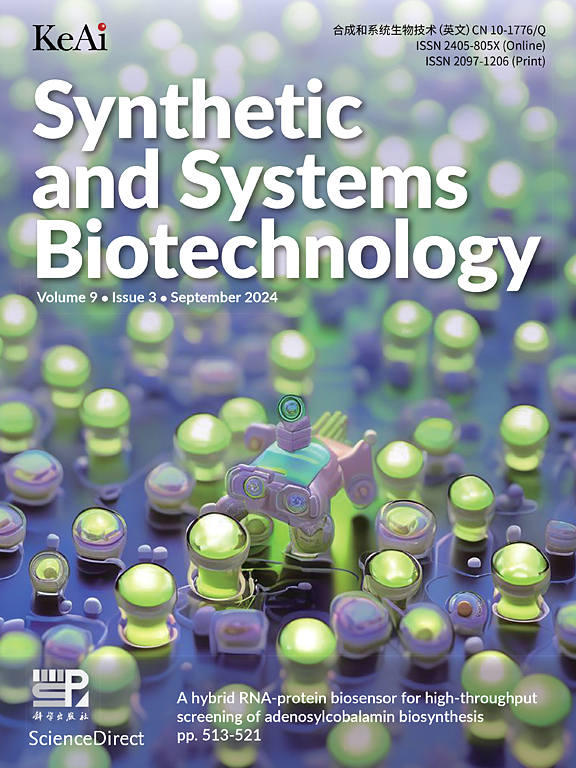Development of a CRISPR/Cas9 genome editing toolbox for Corynebacterium stationis and its application in hypoxanthine biosynthesis
IF 4.4
2区 生物学
Q1 BIOTECHNOLOGY & APPLIED MICROBIOLOGY
引用次数: 0
Abstract
Corynebacterium stationis, a high-GC Gram-positive bacterium with significant industrial potential, has faced limitations due to the lack of efficient genetic tools. In this study, we developed a CRISPR/Cas9-based genome editing platform specifically tailored for C. stationis. First, electroporation efficiency was optimized to 1.81 ± 0.16 × 105 CFU (colony forming units)/μg plasmid DNA through medium selection, pulse parameter adjustments (2.5 kV, 2 pulses), and concentration optimization of cell wall-weakening agents (3.0 % glycine, 0.25 % isoniazid). Three functional shuttle vectors (p99E-pCG1, p19-Kan, p19-Spe) were constructed, enabling stable heterologous gene expression. By engineering a tightly regulated Cas9 expression system (Plac promoter with dual LacO∗ operators), we achieved high-efficiency genome editing, with deletion efficiencies of 81.2–98.6 % for 1.7–50 kb fragments and insertion efficiencies of 27.5–65.2 % for 1–5 kb fragments. CRISPR/Cas9-assisted ssDNA recombineering facilitated single/triple nucleotide changes with >90 % efficiency. Applying this toolbox, we engineered C. stationis for hypoxanthine biosynthesis by combining purA deletion with integration of heterologous feedback-resistant prsD128A and endogenous purF deregulation (purFK334Q), achieving a titer of 0.047 g/L. This study establishes a robust genetic platform for C. stationis, accelerating its industrial application in the production of biochemicals and biofuels.
静止棒状杆菌CRISPR/Cas9基因组编辑工具箱的开发及其在次黄嘌呤生物合成中的应用
静止棒状杆菌是一种具有重要工业潜力的高gc革兰氏阳性细菌,由于缺乏有效的遗传工具而面临限制。在这项研究中,我们开发了一个专门为C. stationis量身定制的基于CRISPR/ cas9的基因组编辑平台。首先,通过介质选择、脉冲参数调整(2.5 kV, 2个脉冲)和细胞壁弱化剂(3.0%甘氨酸,0.25%异烟肼)浓度优化,将电穿孔效率优化为1.81±0.16 × 105 CFU /μg质粒DNA。构建了3个功能穿梭载体(p99E-pCG1、p19-Kan、p19-Spe),实现了外源基因的稳定表达。通过设计一个严格调控的Cas9表达系统(具有双LacO *操作符的位置启动子),我们实现了高效的基因组编辑,在1.7-50 kb片段中缺失效率为81.2 - 98.6%,在1-5 kb片段中插入效率为27.5 - 652%。CRISPR/ cas9辅助的ssDNA重组以90%的效率促进了单/三核苷酸的变化。利用该工具箱,我们将purA缺失与异源反馈抗性prsD128A和内源性purF去调控(purFK334Q)结合,构建了C. stationis次黄嘌呤生物合成,获得了0.047 g/L的效价。本研究建立了一个强大的基因平台,加速了其在生物化学和生物燃料生产中的工业应用。
本文章由计算机程序翻译,如有差异,请以英文原文为准。
求助全文
约1分钟内获得全文
求助全文
来源期刊

Synthetic and Systems Biotechnology
BIOTECHNOLOGY & APPLIED MICROBIOLOGY-
CiteScore
6.90
自引率
12.50%
发文量
90
审稿时长
67 days
期刊介绍:
Synthetic and Systems Biotechnology aims to promote the communication of original research in synthetic and systems biology, with strong emphasis on applications towards biotechnology. This journal is a quarterly peer-reviewed journal led by Editor-in-Chief Lixin Zhang. The journal publishes high-quality research; focusing on integrative approaches to enable the understanding and design of biological systems, and research to develop the application of systems and synthetic biology to natural systems. This journal will publish Articles, Short notes, Methods, Mini Reviews, Commentary and Conference reviews.
 求助内容:
求助内容: 应助结果提醒方式:
应助结果提醒方式:


